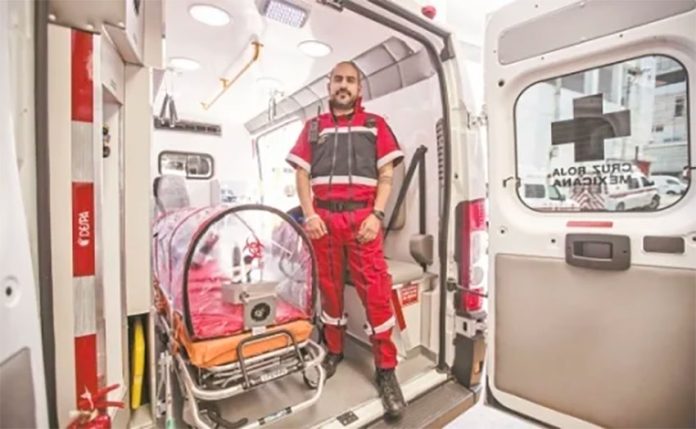Yesterday was the last time Rubén Rodríguez, state coordinator of Red Cross Relief in Mexico City, will spend at home for the foreseeable future.
In an interview with the newspaper El Universal, the paramedic says he will be staying in a hotel room outside of working hours in order to keep his family safe. Rodríguez comes into contact with coronavirus patients on a daily basis, and the possibility of infecting those he loves is not worth the risk.
It’s a fear that surpasses what he experienced as a first responder during the aftermath of Mexico’s September 19, 2017 earthquake, which left 370 dead and 6,011 injured.
“Not even in the earthquake did I see so much fear,” he told the newspaper. Then, if a structure collapsed while he was trying to rescue people, he might be killed, but he knew his family would be safe. “The issue with this is the risk of being infected with a disease that you do not know you are carrying until 14 days later and can pass it on to the people you love.”
Rodríguez works with a team of six specialized Red Cross ambulances that have been adapted to transport people with the coronavirus.
The units are equipped with a plastic capsule to isolate the patient, a ventilator, a vital signs monitor and other limited medical equipment. Rodríguez says they try to keep the interiors stocked with only the most essential items, making them easier to disinfect between patients.
Ambulance rides are carefully triaged. Someone who is experiencing coronavirus symptoms must first call 911, and if they are showing respiratory distress they are referred to a doctor for screening to determine the severity of their symptoms.
If the Red Cross questions the need for transportation, it will send a staff member to the patient’s home on a motorcycle to make an in-person assessment. Only those with complications are taken to hospitals.
Currently, 30% of Mexico City’s 186 Red Cross employees are symptomatic and on medical leave.
The agency has so far carried out 140 transfers of suspected coronavirus patients and 64 with confirmed cases.
Rodríguez reports that since the beginning of the pandemic and as far back as January the Red Cross has provided personnel with supplies including N95 masks, and training to help keep staff and volunteers safe from the virus.
Between transports, Red Cross paramedics seek out other ambulance companies and help train them in proper protocol and use of protective equipment. It helps quell their fear of infection, Rodríguez says.
And that fear is a constant in the lives of those on the frontlines of the pandemic. The risk of infection coupled with fatigue, stress and the psychological effects of treating coronavirus patients is taking its toll, and, in at least Rodríguez’s case, separating families.
The biggest challenge, he says, is that “we are all afraid of the unknown.”
Source: El Universal (sp)
